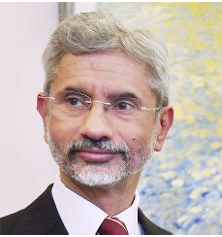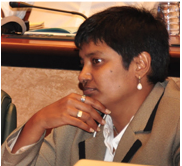[SatNews] Of these, China’s anti-satellite (ASAT) test, an eye opener to India of the kind of challenges that lie next door, was most pertinent...

Foreign Secretary S Jaishankar
Indicating the government’s resolve to bring in synergy in its space policy, the Indian Space Commission has been reconstituted, bringing in the Foreign Secretary as its member for the first time. The Space Commission, headed by the ISRO Chairman, is the highest policy making body pertaining to India’s space exploration activities. The Commission was reconstituted earlier in the month following the appointment of a new chairman at the ISRO. In the reshuffle, one important addition is that of Indian Foreign Secretary S Jaishankar, who took office only a few weeks ago. From the scientific side, the members include Ajit Keshav Kembhavi (Inter-University Centre for Astronomy and Astrophysics, Pune), Goverdhan Mehta (University of Hyderabad), and TK Alex, former director of the ISRO Satellite Centre (ISAC) Bangalore. Other members of the 10-member commission include the Principal Secretary to the Prime Minister, Cabinet Secretary and National Security Advisor.
The induction of the Foreign Secretary suggests a fresh impetus to space in India’s international engagements, both in the strategic and commercial spaces. This is indeed a welcome step. For long [time], outer space was left to the scientific and technical bureaucracy to determine its strategies and vision for the future. Many have argued that the political leadership ought to take responsibility of this domain and outline a policy that blends both the commercial and national security drivers in a fine balance.
India has come a long way since the launching of its first sounding rocket in Thumba near Thiruvananthapuram in 1963. Even as India began its space age with a big focus on social and developmental utilities of outer space, there are important changes both at the international and more pertinently at the regional level that call for changes in India’s approach to outer space. In the last two decades, India had begun to use some space assets, such as remote sensing satellites, for the Indian military although the emphasis has continued to be one of non-weaponisation and peaceful use of outer space.
India today has six dual-use or military satellites but the remaining 21 are meant for social and development utilities. India launched its first dedicated military satellite in August 2013 for the Indian Navy for its communications needs. This was a sign of certain definite changes taking place in India’s space orientations. Even as there is no declared space policy, there are gradual but critical changes to its policies in the recent years, driven by changes in the region and in technological capacities. Of these, China’s anti-satellite (ASAT) test, an eye opener to India of the kind of challenges that lie next door, was most pertinent. ASAT weapons are inherently destabilising and India has to consider how it must respond in order to protect its own assets, possibly developing certain deterrent capabilities in outer space.
Thus, despite a slow start, India is waking up to the new realities and crafting policy and institutional architecture that are more dynamic. The military profile of India’s space programme and policy are becoming more evident. In fact, the balance appears to be tipping in favor of national security more than ever in the past. The launching of the GSAT-7 maritime communication satellite in 2013 was a demonstration of this dynamic shift. The Indian Army and Air Force are slated to have their own dedicated communications satellite later this year. In terms of the institutional architecture, one of the big changes came when in 2008 India established the Integrated Space Cell under the aegis of the HQ Integrated Defence Staff. This was meant as a coordinating body between the different ministries and departments of the government—the military, the Department of Space, and the Indian Space Research Organisation (ISRO). As the then Defence Minister explained, “Although we want to utilize space for peaceful purposes and remain committed to our policy of non-weaponization of space, offensive counter space systems like anti-satellite weaponry, new classes of heavy-lift and small boosters and an improved array of Military Space Systems have emerged in our neighborhood” and thus the need to step up India’s own policies and capabilities. The debate around the establishment of a joint aerospace command started in the early 2000s but this is yet to reach fruition. The Directorate of Aerospace within the IAF and Integrated Space Cell can be seen as the initial avatars of the joint command but the need for a separate command under the responsibility of the IAF is real.

Dr. Rajeswari Pillai Rajagopalan
It appears that the political leadership under Prime Minister Modi is beginning to recognize the need for greater synchronization between the different arms of the government and appreciate the need for better space utilisation in the realm of foreign policy and national security. This new approach needs to be strengthened and sustained for India to tap its full potential in outer space. The Modi Government must next take the step of articulating a national space policy, keeping in mind commercial and national security aspects as the key drivers. Alongside, India must take also the lead in international negotiations in finalising a global space security architecture. New Delhi should not lose time in identifying its partners and working out ways to bring about restraint in terms of irresponsible behaviour in outer space by other players.
By Dr. Rajeswari Pillai Rajagopalan is a Senior Fellow at Observer Research Foundation, New Delhi. She served at the National Security Council Secretariat, Government of India from 2003
This article can be read here.